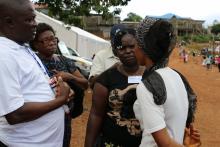Mental health is a critical component in disaster response and recovery
FREETOWN, September 13th 2017 - Sia Twiyor* survived the 14 August mudslides but lost 16 members of her family in the disaster including her husband, brothers and sisters. Some of them had come to spend the school holidays with her. Sia is now struggling to cope and has suffered countless sleepless nights since the incident occurred.
Along with her three young children, Sia travelled to attend a church meeting on the night of 13 August. Because the rain was so heavy, they stayed with family in a different part of the city. This decision would save their lives. “That morning before the landslide, I talked to my husband on the phone. When news of the disaster broke, all of their phones were off. I got worried but of course it never occurred to me that anything like this could possibly have happened.”
Like Sia, survivors and families of those that perished in the mudslides and flooding are still grappling with the realities of their irreparable loss. The human toll and damage to property was huge. Over 500 bodies have been discovered with over 800 people reported missing, all buried under the mountain slice or washed away into the ocean by the deluge.
Trauma is a major issue for those affected. Many families have been displaced and have relocated to makeshift structures. Children have also been orphaned, staying with family members, often wanting for essential resources, or in camps.
Mobilising a mental health response
In order to support the mental health needs of those affected, the Ministry of Health and Sanitation and the World Health Organization (WHO) with funding from the UK Government (UKaid), JSI and USAID quickly deployed Mental Health Nurses pulled from other parts of the country to provide urgent Psychological First Aid, focusing initially on psychosocial and trauma counselling.
“Allowing people to talk through their conditions can help in the immediate aftermath of a disaster, when many survivors will experience shock and grief,” says Dr Florence Baingana, Mental Health Specialist at WHO Sierra Leone. “Counselling provides a forum for them to express their feelings and identify coping mechanisms and resources, while helping to prevent more severe conditions.”
The nurses engage the survivors in groups and in individual sessions with messages of hope and relief. They also conduct physical assessments and refer those with critical needs to existing services and resources where they can continue to receive help, including from the country’s three practicing psychiatrists. However, mental health needs also evolve, and some weeks after the initial shock has passed more severe disorders can often become apparent, Dr. Baingana explains.
Almost four weeks after the incident, hundreds of people in the affected communities and camps have received counselling. “We are seeing people with depressive disorders; severe anxiety; post-traumatic stress disorder; getting panic attacks whenever it starts to rain. They feel highly insecure,” says Hawanatu Foday, a mental health nurse deployed in one of the communities. As time progresses and families strive to settle down, Hawanatu says the psychological effects of the devastation are becoming even clearer.
For Sia and many other survivors and relatives, the sight of the towering mountain ridge that glided and buried hundreds of their family members continues to serve as a constant reminder of their horrors and trauma. As children return to school, one woman breaks down, reminded of the loss of her own young ones in the tragedy.
“Trauma care will not solve the immediate challenges that the affected communities are going through, but can help prevent some long term psychological impacts for those that are still in shock and in denial after the biggest natural disaster on record in this country,” says Dr Baingana. “The next step is ensuring that the country can meet longer term mental health needs. This will require significant support, attention and investment from all involved, long after the media interest wanes and the hustle and bustle of daily life resumes.”
* Names have been changed to protect the privacy of survivors




